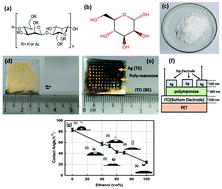With the shift towards reducing electronic waste, bio-organic materials are considered as prominent alternatives due to their biodegradability and benign environmental impacts. Herein, polymannose is used to demonstrate resistive-switching characteristics with twelve distinctive and reliable memory states that were modulated by the compliance current at a READ voltage as low as −0.05 V. D-Mannose powder and ethanol were mixed to produce the precursor for the formation of a polymannose film via drop casting on an ITO/PET substrate and dried at 160 °C for different durations before an array of Ag was deposited as the top electrode. The optimal drying time of 7 h provided competitive resistive switching characteristics, with a READ window of 2.2 V, high ON/OFF ratio of >105 at a relatively low READ voltage of 0.01 V, acceptable endurance cycles of approximately 102, and retention time of >104 s. These results demonstrate the potential of polymannose as a candidate material for environmentally friendly resistive-switching random access memory.
